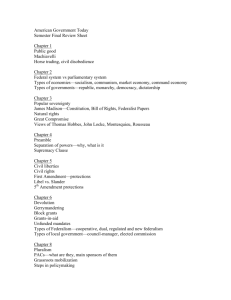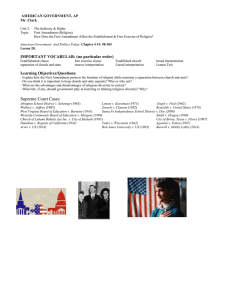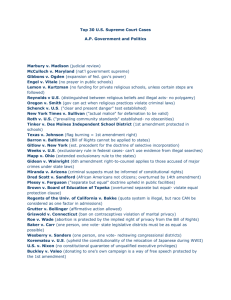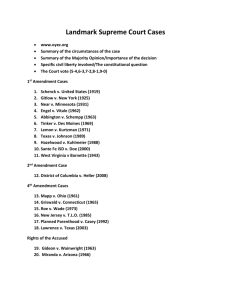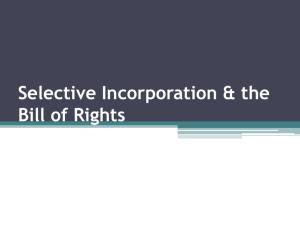No Slide Title - My Teacher Pages
advertisement
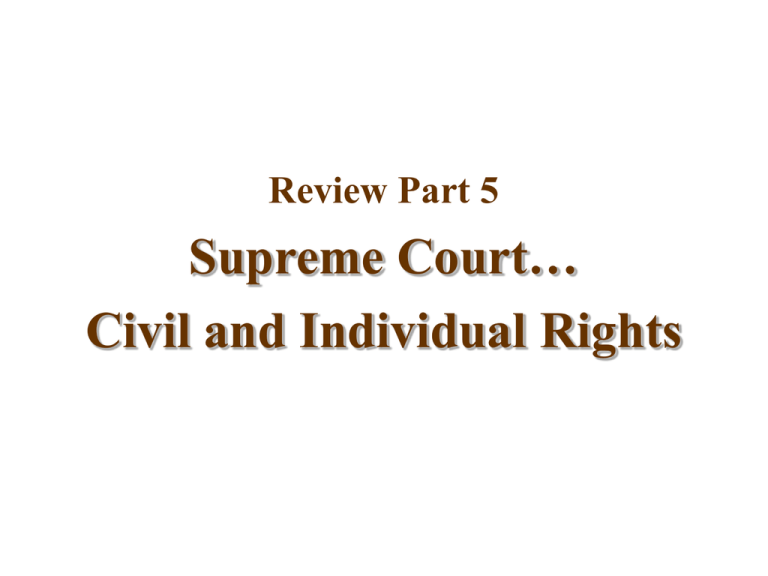
Review Part 5 Supreme Court… Civil and Individual Rights 1) The First Amendment protects all of the following freedoms EXCEPT a. Freedom of religion b. Freedom of choice c. Freedom of the press d. Freedom of speech e. Freedom of assembly 1) The First Amendment protects all of the following freedoms EXCEPT a. Freedom of religion b. Freedom of choice c. Freedom of the press d. Freedom of speech e. Freedom of assembly 2) Jefferson’s reference to “unalienable rights” in the Declaration of Independence relates to a. Laws passed by Parliament b. Laws passed by the colonial legislature c. Laws that did not protect aliens d. Traditions of the Enlightenment e. Rights that cannot be legally taken away 2) Jefferson’s reference to “unalienable rights” in the Declaration of Independence relates to a. Laws passed by Parliament b. Laws passed by the colonial legislature c. Laws that did not protect aliens d. Traditions of the Enlightenment e. Rights that cannot be legally taken away 3) When creating the Constitution, the Founding Fathers did not include a bill of rights because a. b. c. d. The Anti-Federalists opposed such a bill They had too many other issues to consider They were unsure of what to include They believed such a bill was unnecessary because the states already had such protections e. James Madison lobbied against such a bill 3) When creating the Constitution, the Founding Fathers did not include a bill of rights because a. b. c. d. The Anti-Federalists opposed such a bill They had too many other issues to consider They were unsure of what to include They believed such a bill was unnecessary because the states already had such protections e. James Madison lobbied against such a bill 4) The Fifth Amendment guarantees all of the following legal protections EXCEPT a. Freedom of double jeopardy b. Freedom from being compelled to testify against oneself c. Freedom from cruel and unusual punishment d. Indictment by a grand jury e. Compensation for land taken by eminent domain 4) The Fifth Amendment guarantees all of the following legal protections EXCEPT a. Freedom of double jeopardy b. Freedom from being compelled to testify against oneself c. Freedom from cruel and unusual punishment d. Indictment by a grand jury e. Compensation for land taken by eminent domain 5) States are now prohibited from infringing upon the rights protected by the federal Bill of Rights because of a. An executive order issued by President Washington b. A provision in the Fourteenth Amendment c. Legislative action by the first Congress d. An introduction to the document which mandates it e. Their state constitutions which require it 5) States are now prohibited from infringing upon the rights protected by the federal Bill of Rights because of a. An executive order issued by President Washington b. A provision in the Fourteenth Amendment c. Legislative action by the first Congress d. An introduction to the document which mandates it e. Their state constitutions which require it 6) The Gideon, Escobedo, and Miranda cases all concerned which of the following issues? a. School prayer b. Saluting the flag c. The rights of the accused d. Eminent domain e. Freedom of Speech 6) The Gideon, Escobedo, and Miranda cases all concerned which of the following issues? a. School prayer b. Saluting the flag c. The rights of the accused d. Eminent domain e. Freedom of Speech 7) A case which expanded the concept of symbolic speech to include wearing armbands was a. Tinker v. Des Moines b. Engel v. Vitale c. Abington Township v. Schempp d. Mapp v. Ohio e. Bakke v. Regents 7) A case which expanded the concept of symbolic speech to include wearing armbands was a. Tinker v. Des Moines b. Engel v. Vitale c. Abington Township v. Schempp d. Mapp v. Ohio e. Bakke v. Regents 8) The significance of the Gitlow case was that it a. Affirmed the right of a Socialist to make inflammatory speeches b. Mandated that state governments uphold the provisions of the federal Bill of Rights c. Interpreted the death penalty as a cruel and unusual punishment d. Upheld the constitutionality of the exclusionary rule e. Outlawed reverse discrimination 8) The significance of the Gitlow case was that it a. Affirmed the right of a Socialist to make inflammatory speeches b. Mandated that state governments uphold the provisions of the federal Bill of Rights c. Interpreted the death penalty as a cruel and unusual punishment d. Upheld the constitutionality of the exclusionary rule e. Outlawed reverse discrimination 9) In a the Korematsu case (1944) the Supreme Court a. Declared the Japanese relocations to be unlawful b. Declared the US citizens of Japanese origin to be exempted from the relocation order c. Upheld the measure as reasonable in wartime d. Ruled that Japanese residents of the West Coast were entitled to equal protection e. Ruled that reverse discrimination was a major factor in the decision 9) In a the Korematsu case (1944) the Supreme Court a. Declared the Japanese relocations to be unlawful b. Declared the US citizens of Japanese origin to be exempted from the relocation order c. Upheld the measure as reasonable in wartime d. Ruled that Japanese residents of the West Coast were entitled to equal protection e. Ruled that reverse discrimination was a major factor in the decision 10) The Civil Rights Acts of the 1960s did NOT apply to which group? a. Black Americans b. Hispanic Americans c. Female Americans d. Asian Americans e. Elderly Americans 10) The Civil Rights Acts of the 1960s did NOT apply to which group? a. Black Americans b. Hispanic Americans c. Female Americans d. Asian Americans e. Elderly Americans The End
